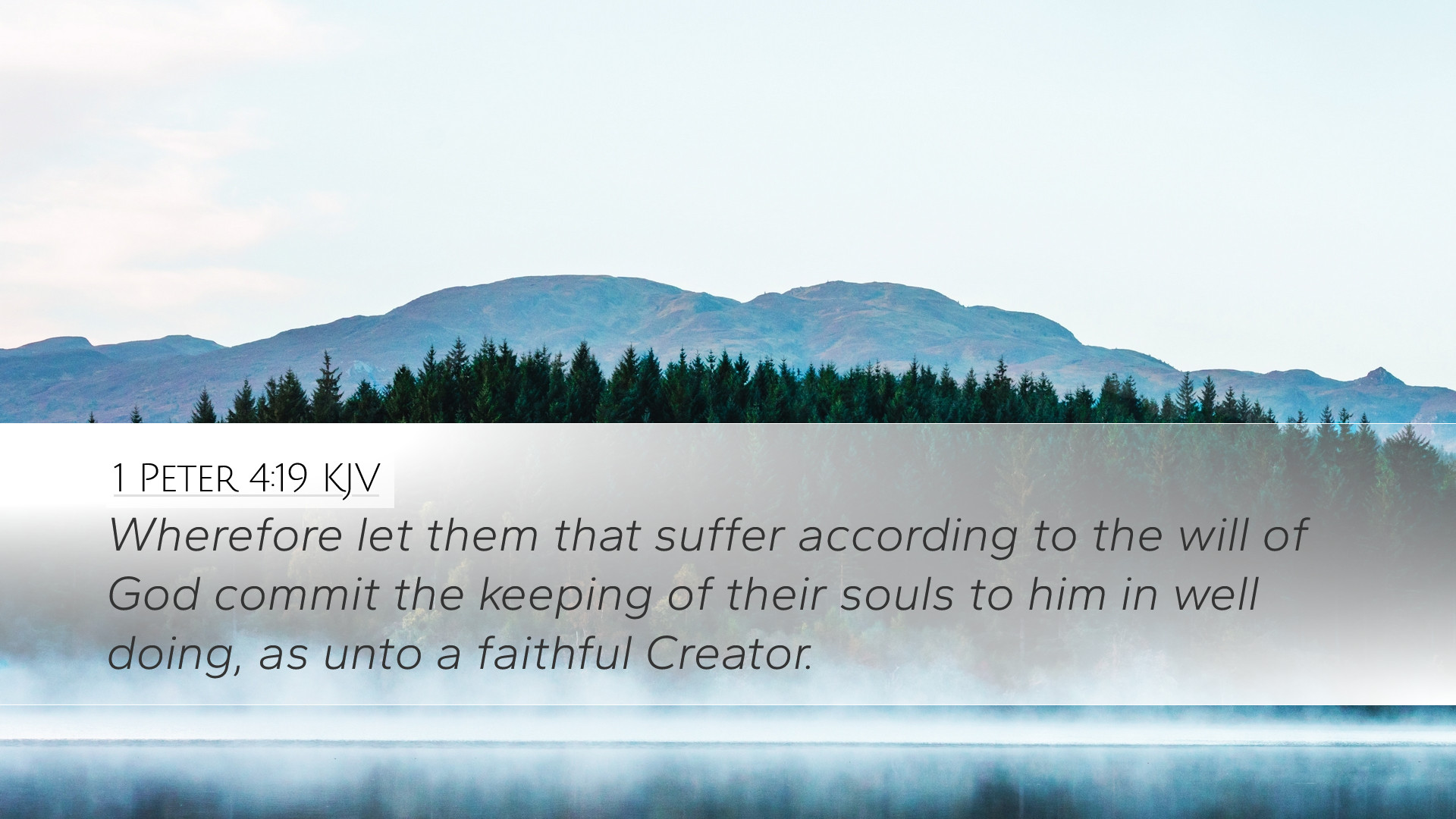Old Testament
Genesis Exodus Leviticus Numbers Deuteronomy Joshua Judges Ruth 1 Samuel 2 Samuel 1 Kings 2 Kings 1 Chronicles 2 Chronicles Ezra Nehemiah Esther Job Psalms Proverbs Ecclesiastes Song of Solomon Isaiah Jeremiah Lamentations Ezekiel Daniel Hosea Joel Amos Obadiah Jonah Micah Nahum Habakkuk Zephaniah Haggai Zechariah Malachi1 Peter 4:19
1 Peter 4:19 KJV
Wherefore let them that suffer according to the will of God commit the keeping of their souls to him in well doing, as unto a faithful Creator.
1 Peter 4:19 Bible Commentary
Commentary on 1 Peter 4:19
Verse Context: 1 Peter 4:19 states: “Therefore let those who suffer according to the will of God commit their souls to Him in doing good, as to a faithful Creator.” This verse reflects the theme of suffering that permeates the letter and offers theological insights on the relationship between suffering and the divine will.
1. The Nature of Suffering
Albert Barnes emphasizes that the suffering mentioned here is coupled with righteousness, indicative of a believer's experience of persecution for their faith. This suffering is not simply random hardship but serves a purpose within God's redemptive plan.
2. Suffering According to God's Will
- Matthew Henry notes that suffering can be a method through which God tests and refines His people. It is imperative for believers to understand that their trials may be allowed by God for their spiritual benefit and the advancement of His glory.
- Adam Clarke asserts that the phrase “according to the will of God” signifies that not all suffering is a result of divine displeasure; indeed, while God may permit trials, He also provides the grace necessary to endure them.
3. Commitment to God
The second part of the verse highlights the need for believers to commit their souls to God. This commitment indicates a deep trust in God's sovereignty and faithfulness. It calls on Christians to surrender their very lives and eternal destinies into the hands of the Creator, who is faithful.
- Matthew Henry elaborates that this commitment is both a confession of faith and a call to action—continuing to do good despite suffering.
- Albert Barnes explains that this act of committing conveys a reliance on God's oversight and His unfaltering commitment to those who serve Him diligently.
4. The Good Works in Suffering
Peter urges believers to continue engaging in good works even amid suffering. This signifies that the essence of a believer's life is to emulate Christ, who suffered but did not engage in sin.
- Adam Clarke states that ‘doing good’ is a testament to one's faith and resilience amid hardship, an embodiment of the teachings of Christ, who admonished His followers to love their enemies and do good to those who persecute them.
- Matthew Henry adds that performing good works during times of trial often counters the shame inflicted by persecutors and may even lead them to reconsider their stance toward Christianity.
5. The Character of God as Creator
The title “faithful Creator” reinforces God's unchanging nature and unfailing character. This descriptor highlights two critical attributes of God—His commitment and His creative power.
- Albert Barnes notes that recognizing God as the Creator assures believers of His omnipotence and omniscience, empowering them to trust His plans even in adversity.
- Adam Clarke comments on the significance of God’s faithfulness; amidst trials, believers have the assurance of His care and oversight, reminding them of the goodness embedded within His sovereign will.
6. Theological Implications
1 Peter 4:19 invites theological reflection on suffering and the divine purpose behind it. It poses critical questions about the believer's response to trials and emphasizes a life characterized by faithfulness amid challenges.
- Matthew Henry discusses the necessity for believers to embrace not only the joy of salvation but the reality of suffering as integral to spiritual growth.
- Adam Clarke articulates the transformative experience derived from suffering, suggesting it aligns believers more closely with the character and example of Christ.
7. Conclusion
Summarizing insights drawn from prominent commentaries, 1 Peter 4:19 serves as a profound reminder of the interplay between suffering, faith, and good deeds. As Christians face trials, they are called to remain steadfast, committing themselves to God’s care and sovereignty while actively engaging in good works. This verse establishes a framework for understanding that God uses suffering within His divine will, affirming His faithfulness as Creator through all life's circumstances.


